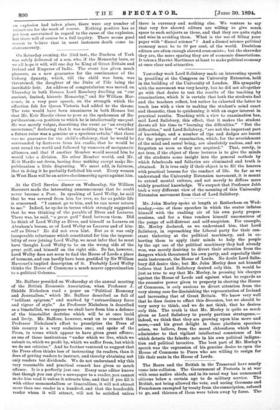Mr. John Morley spoke at length at Rotherham on Wed-
nesday,—one of those speeches in which the orator inflates himself with the exalting air of his own party prepos- sessions, and for a time renders himself unconscious of the pangs of self-distrust and self-suspicion. For example, Mr. Morley declared, as we understand him, that Lord Salisbury, in reproaching the Liberal party for their con- stant tinkering at the political machinery, and in ex- horting them to apply their minds to help the people by the apt use of the political machinery they had already won, was merely desiring to divert their attention from the dangers which threatened his own party, and especially their main instrument, the House of Lords. No doubt Lord Salis- bury did desire this ; but Mr. John Morley does not himself believe that Lord Salisbury desired only this. It would be• just as true to say that Mr. Morley, in pressing his charges against the House of Lords and against what he regards as the excessive power given to property in electing the House of Commons, is only anxious to divert attention from the very strong case for diminishing the representation of Ireland and increasing that of Great Britain. We know very well that he does desire to effect this diversion, but we should be- very sorry to think, and we do not think, that he desires. only this. The truth is that Mr. Morley is quite as much given as Lord Salisbury to purely partisan stratagems,— indeed, we think that they are growing upon him more and more,—and his great delight in these platform speeches arises, we believe, from the moral chloroform which they administer to that vigilant intellectual conscience of his which detects the falsetto note in his own political indigna- tion and political invective. The best part of Mr. Morley's speech was the expression of his genuine desire to open the House of Commons to Peers who are willing to resign for life their seats in the House of Lords.


















































 Previous page
Previous page